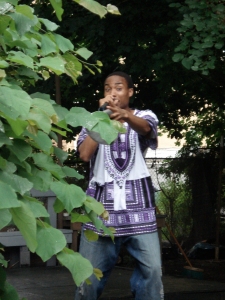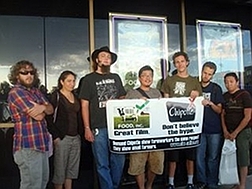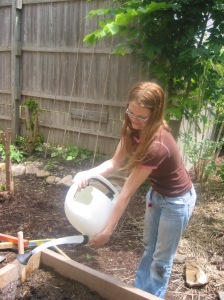By Slow Food USA Youth Programs Intern Reece Trevor
 This week, a New York community garden is played host to an impressive combination: community organizing, hip-hop music, and an important message about healthy and sustainable food. The Grassroots Artists’ Movement—G.A.ME, to those in the know—kicked off its first annual Go Green Hip-Hop Tour last Wednesday. G.A.ME’s mission is an innovative one. It uses the powerful medium of hip-hop music to increase awareness of and promote action on various socioeconomic issues in the black and Latino communities. When the organization first began in 2001, its focus was on providing a safety net and network for rap artists themselves, but it’s expanded significantly in recent years. Lawrence James, G.A.ME’s former director, presents his organization as a hybrid of a labor union and community organizing non-profit. James emphasizes hip-hop artists’ leadership potential, saying that G.A.ME works with “artists who are trying to educate and organize others so that, hopefully, our whole community can be reached.”
This week, a New York community garden is played host to an impressive combination: community organizing, hip-hop music, and an important message about healthy and sustainable food. The Grassroots Artists’ Movement—G.A.ME, to those in the know—kicked off its first annual Go Green Hip-Hop Tour last Wednesday. G.A.ME’s mission is an innovative one. It uses the powerful medium of hip-hop music to increase awareness of and promote action on various socioeconomic issues in the black and Latino communities. When the organization first began in 2001, its focus was on providing a safety net and network for rap artists themselves, but it’s expanded significantly in recent years. Lawrence James, G.A.ME’s former director, presents his organization as a hybrid of a labor union and community organizing non-profit. James emphasizes hip-hop artists’ leadership potential, saying that G.A.ME works with “artists who are trying to educate and organize others so that, hopefully, our whole community can be reached.”
Here’s where the Go Green campaign comes in. G.A.ME’s leadership was quick to recognize that dozens of African-American and Latino communities nationwide face massive challenges when it comes to sustaining a diet that’s good, clean, and fair. The key to overcoming these challenges, they say, is to raise awareness. To that end, G.A.ME partnered with a half-dozen local hip-hop artists, not to mention groups ranging from the Bronx-based GreenThumb to Slow Food USA.
Surrounded by Green Thumb Garden’s apple trees and beds of organic greens, these artists eloquently explained the personal, societal, and environmental importance of slow food as the event’s organizers distributed literature and spoke with passersby about how to eat well in an urban environment. As one of Green Thumb’s gardeners put it as she gestured to a box of composting worms, “I’ve been working with plants all my life—we’re trying to make sure more people can say that.”
Upcoming Go Green Tour Events:
Thursday, June 25, 6-9 p.m.: Baltimore, John Eager Howard Recreation Center.
Friday, June 26, 6-10 p.m.: Boston, Blackstone Community Center.
Saturday, June 27, 12-4 p.m.: New York, 167th St. bet. Gerard and Cromwell Avenues.
Sunday, June 28,: Richmond, details TBD.
For more information, visit G.A.ME’s website.

 For nearly three years, kids in Bennington, Vermont, have been getting a kind of education that doesn’t—sadly—appear in most school curricula. The
For nearly three years, kids in Bennington, Vermont, have been getting a kind of education that doesn’t—sadly—appear in most school curricula. The  With support from Slow Food USA’s Garden-to-Table micro-grant program, Blooming Chefs recently published a cookbook drawn from its students’ experiences. The cookbook is impressive on its own, but even more so because it’s the result of a community working together. Blooming Chefs’ biggest strength is that it gets a remarkable cross-section of the Bennington community united to teach kids about good, clean, and fair food. Adinolfi herself puts it best: “this is a powerful inter-linking of organizations working towards common goals.”
With support from Slow Food USA’s Garden-to-Table micro-grant program, Blooming Chefs recently published a cookbook drawn from its students’ experiences. The cookbook is impressive on its own, but even more so because it’s the result of a community working together. Blooming Chefs’ biggest strength is that it gets a remarkable cross-section of the Bennington community united to teach kids about good, clean, and fair food. Adinolfi herself puts it best: “this is a powerful inter-linking of organizations working towards common goals.” This week, a New York community garden is played host to an impressive combination: community organizing, hip-hop music, and an important message about healthy and sustainable food. The
This week, a New York community garden is played host to an impressive combination: community organizing, hip-hop music, and an important message about healthy and sustainable food. The